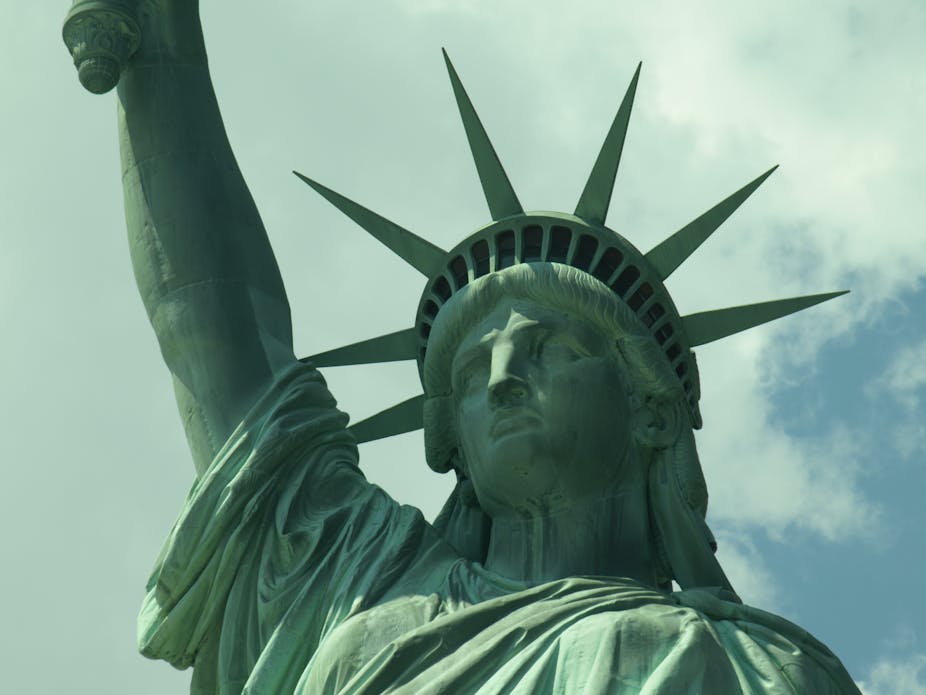The reputation of the American political system both at home and abroad has taken a battering of late. A recent poll showed the overall approval rating for Congress at just 11%, falling from what were already very low levels. It’s time the US put a little effort in to winning back its former friends.
After a deal was finally brokered on the debt ceiling on October 16, Barack Obama said that “probably nothing has done more damage to America’s credibility in the world … than the spectacle that we’ve seen these past several weeks”.
It was refreshing that a US president, for once, spoke the truth about the harm done to his country’s global standing by its own failings. That America’s international credibility was damaged by the shutdown is not in doubt – where in the developed world can there be such rabid opposition to a government’s attempts to extend healthcare to a large chunk of the population? Yet the Tea Party Republicans utter not a peep when far greater sums are spent on the military and waging of wars.
But is it really true that nothing has done more damage? What about the present avalanche of leaks about NSA spying? Obama has nothing to say of it, just as he kept silent about the damage done to America’s standing by the Chelsea Manning leaks. Then there are the black marks of Guantanamo, Abu Ghraib and Bagram which have shamed America over the past decade.
When it comes to serious damage, surely top of the list are the many countries and millions of people who have suffered at the hands of America’s foreign policies and interventions. Since World War II, America’s actions have all too often been characterised by lawlessness and criminality, centred on incessant wars and attendant war crimes which have resulted in the killing of countless millions of people – the body count exceeded only by the evil trinity of Hitler, Stalin and Mao. Indochina, Latin America, and the Middle East have in particular been devastated by US interventions.
In 2007, during the George W Bush years, a BBC World Service poll of 22 countries rated US influence as negative overall. This changed to a positive influence in 2010, a year after Obama arrived in office with his vision of hope. But since then, America’s influence has been middling at best. The poll for 2013 shows that 45% of those surveyed thought US influence was mainly positive while 34% thought it mainly negative. It would not be surprising to see the overall numbers turn negative again in the future.
Self-serving “doctrines” have long been put forward as justification for American intervention in order to mask imperial ambitions. Truman, Eisenhower, Kennedy, Johnson, Nixon, Carter, Clinton and Bush Junior have all had doctrines named after them and, in each case, the doctrine sets the terms for launching a war. Surely it is only a matter of time before an “Obama doctrine” is proclaimed: the waging of war by use of drones and cruise missiles.
The American paradox
America’s claim to be the land of the free was always hyperbole. During the World War II, black soldiers saw immense hypocrisy in being told to fight for freedom abroad given the institutionalised racism they experienced at home. Since then, and after much struggle, great progress has been made on this front but genuine freedom and equality remains a long way off. America’s motto E pluribus unum (out of many, one) remains most elusive.
America today remains a paradox. Despite its dysfunctional polity and unashamedly imperial adventures, its achievements are immense. It has more Nobel Prize winners than any other country, it is the bedrock of the technology industry that has transformed the lives of the majority of the world’s population in an astonishingly short period of time and its music and film industries are unrivalled. Its productive capacity is enormous, enabling it to spend – or waste – vast amounts on its military.
The “American dream” retains its magnetic appeal too. People from across the world clamour to live in the US and have received a relatively warm welcome. The US is one of the countries most open to immigration - in 2006, for example, the US accepted more legal immigrants as permanent residents than all the other countries who run “green card” immigration systems combined. As US academics Reza Aslan and Aaron Hahn Tapper found in their 2011 study, “Muslims and Jews in America”, Muslims from 68 countries have settled in the US – a country supposedly at war with Islam. And countless millions more would doubtless like to do the same. It has always stuck in my mind when some years ago, the late diplomat Richard Holbrooke, in a televised press conference, summed up the attitude to America when he related about a trip to South Asia being told by his hosts: “For God’s sake, the US should just go home … And take us with you!”
On a pedestal on the Statue of Liberty is inscribed the poem The New Colossus with the famous, inspiring, line: “Give me your tired, your poor, your huddled masses yearning to breathe free”. Despite America’s often brutal nature, there is no avoiding the fact that the sentiments of this poem still ring true to millions around the world. It might appear a distant fantasy but if the US can somehow curb its destructive zeal, perhaps by adopting a Hippocratic “do no harm” doctrine, it could help to realise the aspirations of its own citizens and help many others around the globe attain their own version of the American dream.

